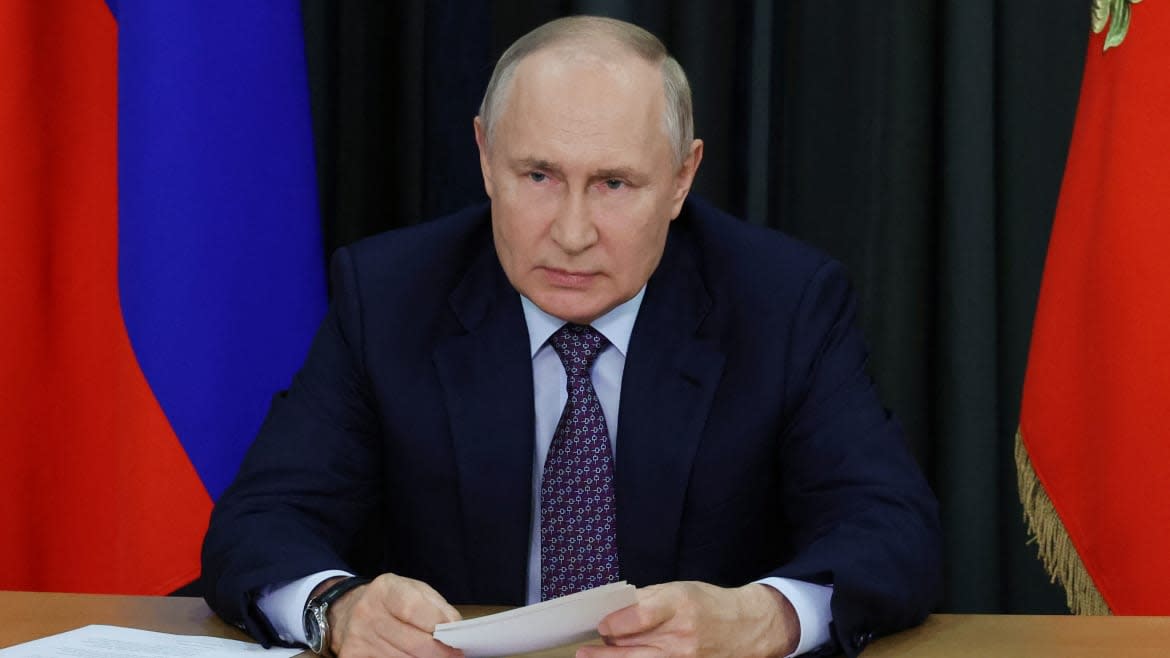Prigozhin’s Men Poached in Hiring Spree Linked to Kremlin

- Oops!Something went wrong.Please try again later.
- Oops!Something went wrong.Please try again later.
As soon as Wagner boss Yevgeniy Prigozhin’s plane crashed late last month, just two months after his failed march on Moscow, questions began to swirl about the future of his sweeping Wagner empire.
A clearer picture is emerging from inside Moscow, indicating that Wagner will not entirely disappear into the ether, but rather take on new forms in the coming days to serve Kremlin interests.
Private mercenary groups with ties to Russian security forces are currently working to absorb Wagner fighters into their own operations in the wake of Prigozhin’s death, The Wall Street Journal reported.
Some are joining up with Redut, which is financed by Gennady Timchenko, an oligarch with ties to Russian President Vladimir Putin, a Wagner defector said, The Wall Street Journal reported. Redut is a private military company with links to Russia’s GRU and the Russian Ministry of Defense, according to the U.S. government, which sanctioned Redut earlier this year.
A former Wagner officer is overseeing the process of funneling Wagner fighters to work for Redut, according to the Journal.
Kremlin’s New Plan: Blame Anyone But Putin for Prigozhin’s Death
Another private military group, Convoy, which has reportedly received funding from close Putin ally Arkady Rotenberg, has been seeking to round up Wagner fighters as it works to bolster its operations in Africa, according to the Journal.
Redut and Convoy had both previously expressed interest in taking their businesses further into African countries, according to the Associated Press.
In other efforts to take on Prigozhin’s fighting forces, the Kremlin is taking control of some units of Wagner Group that have been working in the Middle East and Africa, the Journal reported.
The shifts are just the latest indication that a broader, behind-the-scenes adjustment is taking place in the security architecture of Russia, as Kremlin-linked groups work to take advantage of Prigozhin’s fighting force and influence in other countries.
The dismantling and absorption of Wagner’s operations came before Prigozhin’s death. In response to Prigozhin’s failed march on Moscow, which was seen as the largest challenge to Putin’s rule in years, the Russian Ministry of Defense announced that it would be seizing assets from Wagner Group. That included tanks, mobile rocket launchers, and anti-aircraft systems, before Prigozhin was exiled to Belarus. Moscow informed Wagner fighters they could either relocate, retire, or join the conventional military.
Other signs have emerged that Russia is reshaping its security apparatus following Prigozhin’s failed revolt. Just after Prigozhin’s failed coup, Russia began taking steps to create new security enterprises throughout the country in an effort to create military companies under a tighter watch from the Kremlin.
The new special military enterprises were shaped in a way that could be governed locally and simmer unrest, but be run at the behest of the Kremlin and disbanded at nearly a moment’s notice to curtail any potential further mutinies or Prigozhin copy-cats.
Other changes for Wagner fighters are afoot. In Belarus, where thousands of Wagner mercenaries relocated after the June revolt, Wagner fighters are leaving, according to assessments from Lithuania and Belarus’ opposition government.
As soon as Prigozhin’s plane crashed, European officials began speculating about the future of Wagner fighters and whether they would leave Belarus for new contracts or join other private military companies.
“We are watching the situation with vigilance,” Lithuania’s Prime Minister Ingrida Šimonytė said last week.
A top official of the democratic opposition in Belarus previously told The Daily Beast Wagner Group might fall apart inside Belarus following Prigozhin’s death.
How Prigozhin Could Wreak Havoc From Beyond the Grave
“Wagner Group cannot exist without its leader,” Franak Viacorka, the chief political adviser of Belarusian democratic opposition leader Sviatlana Tsikhanouskaya, told The Daily Beast. “Hopefully we will see some changes in Wagner’s presence in Belarus.”
But even as some Wagner fighters are absorbed into private military companies, Prigozhin has left disorder in his wake.
Poland, which has raised alarm about provocations and a hybrid destabilization operation from Russia, Belarus, and Wagner fighters in recent weeks, has been working with the U.S. intelligence community in recent days.
The U.S. Director of National Intelligence Avril Haines spoke with Poland’s Minister of Interior and Administration Mariusz Kamiński in recent days to share updates on Wagner Group, Kamiński said, according to TVP World.
In Belarus, “confusion” has emerged among Wagner recruits, according to an assessment from Lithuania.
Exiled Wagner fighters had been training with Belarusian soldiers, raising concerns in Lithuania, Latvia, and Poland about provocations and the possibility of Belarus forcing a migrant influx at shared borders. The situation has stalled in recent days, however, Lithuania’s president, Gitanas Nauseda, said.
“The situation hasn’t escalated,” Nauseda told LRT. “We see certain confusion within Wagner after Prigozhin’s death.”
Get the Daily Beast's biggest scoops and scandals delivered right to your inbox. Sign up now.
Stay informed and gain unlimited access to the Daily Beast's unmatched reporting. Subscribe now.

